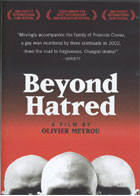
Beyond Hatred (Au Dela de la Haine) 2005
Distributed by First Run/Icarus Films, 32 Court St., 21st Floor, Brooklyn, NY 11201; 800-876-1710
Producer n/a
Directed by Olivier Meyrou
DVD, color, 85 min.
Sr. High - Adult
Gay and Lesbian Studies, Gender Studies
Date Entered: 03/08/2007
Reviewed by Dan DiLandro, E.H. Butler Library, State University of New York College at BuffaloBeyond Hatred documents the progression of a French “gay bashing” murder and subsequent trial, focusing primarily on the victim’s family and the unraveling of the events of the crime itself. Beginning 730 days after the crime, the film follows the family of the victim, Francois Chenu, deeply examining their thoughts and emotions as they travel through the French legal system until the verdict and punishment are decided. The documentary narrative also interviews the prominent figures involved in the trial, including prosecution and defense lawyers as well as relatives of the accused.
The essential power of the film resides in its documentary style. The Chenu family’s anger, confusion and ambivalence are shown to evolve to an understanding of the crime and a plea for universal tolerance. In the same way, details of the crime unfold in interviews with the prosecuting attorney and in the voice-overs provided by the testimony of the accused (due to their youth, the perpetrators are not shown). In groups or educational settings, these facts will provide a firm platform for discussion: for instance, testimony reveals that the “skinhead” criminals had intended to attack “an Arab,” when coming across the homosexual Chenu. The film thus asks viewers to consider, for example, the ideology of hatred--both racial and homophobic--and questions whether such bigotry is a product of environment, neglectful parents, gang mentality, simple stupidity, or political affiliation.
As a straight-forward documentation of events, of course, the film itself does not “debate” issues, but provides a wide variety of opposing viewpoints. In so doing, there is much theorizing as the Chenu family tries to reconstruct the exact events of the crime, as the opposing lawyers seek to “spin” their cases based on possible motivations, and as the perpetrators’ families try to mitigate the crimes. This “theorizing” only strengthens the narrative, and offers many opportunities for discussion. What can be made of the fact that, for instance, the gay man refused to “unacknowledge” his homosexuality, as the perpetrators insist? “He insulted us,” they say, apparently by referring to the three-on-one assailants as “cowards” and fighting back. What can be derived from the fact that the victim died not from the beating, but from drowning, as the accused--ideological “Supermen”--tried to hide their crime? Indeed, viewers aware of the issues involved with “being out” might wonder about the prosecutor’s satisfaction with Madame Chenu knowing her son was gay; the crime would make more sense having that knowledge, the attorney implies.
In French with English subtitles, Beyond Hatred is a technically highly recommended film. Audiences may be initially confused in some scenes; it is at first occasionally difficult to determine who is being recorded by the camera and what the conversation is specifically about. The material is necessarily heavy and is shown in a somewhat “arty” way. For instance, viewers unfamiliar with (European) documentary filmmaking may not be comfortable with long scenes of the park where the murder occurred, sometimes with voice-overs, sometimes with none. Given the content and style of the film, there is not a great deal of closure, and certainly not a happy ending, per se; all of the personages are proven to betray ambivalence regarding the crime and the trail. This should prove no problem for mature and attentive viewers.
Beyond Hatred is highly recommended for high school through adult audiences and for libraries with curricula or audiences interested in European studies and criminal justice, but most especially for gay and lesbian and gender studies.
Awards
- Teddy Award Winner for Best Documentary, 2006 Berlin Film Festival